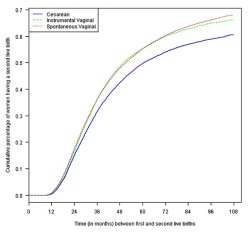
Data from retrospective study conducted 2000-2008 with reported deficits in childbearing subsequent to Cesarean delivery, prior to the First Baby Study. Cumulative percentage of women who had at least one further live birth over eight to nine years follow-up after first birth.1
While retrospective studies conducted in countries throughout the world have reported deficits in childbearing subsequent to Cesarean delivery (including a study conducted from 2000 to 2008,* see figure), the First Baby Study (FBS), conducted by researchers at Penn State Hershey Medical Center, is the first prospective interview study designed specifically to investigate the effect of Cesarean delivery on subsequent childbearing and understand why the post-Cesarean fertility deficit occurs. More than 3,000 women were interviewed during their third trimester, and again at one, six, twelve, eighteen, twenty-four, thirty and thirty-six months postpartum. These women delivered between 2009 and 2011 at seventy-six hospitals in Pennsylvania, and approximately one-third had a Cesarean delivery. The primary goal of the interviews was to measure factors related to subsequent childbearing – including marital and relationship issues, use of birth control, subsequent pregnancy intentions, unprotected intercourse over the three years of follow-up, and difficulty conceiving or carrying subsequent pregnancies. Continue reading
